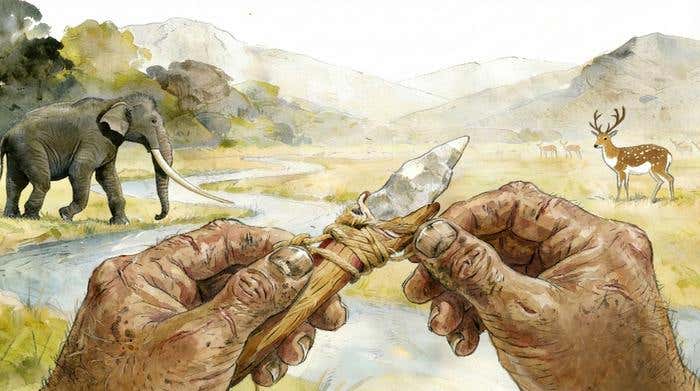If it pays to be a jerk, why doesn’t everyone do it?
Many of the same personality traits that are associated with success in chimpanzees are also associated with success in humans.

[Apr. 25, 2023: Staff Writer, The Brighter Side of News]
Male chimps that exhibit brutish behavior tend to climb higher on the social ladder and sire more offspring than their deferential counterparts. (CREDIT: Weizmann Institute of Science)
Male chimps that exhibit brutish behavior, such as throwing tantrums, shoving aside or stealing from their colleagues, tend to climb higher on the social ladder and sire more offspring than their more conscientious and deferential counterparts, according to a new study published in the journal PeerJ Life and Environment.
The study was conducted by a team led by researchers from the University of Edinburgh and Duke University.
The researchers followed 28 male chimpanzees living in Gombe National Park in Tanzania. They found that male chimps with certain personality traits, such as high dominance and low conscientiousness, tend to fare better in life than others.
The personality assessments were conducted by Tanzanian field researchers who had observed the chimpanzees’ behavior and interactions with each other over the course of several years. The findings suggest that personality plays a critical role in determining a chimp’s social status and reproductive success.
Related Stories:
“It’s an evolutionary puzzle,” said Joseph Feldblum, assistant research professor of evolutionary anthropology at Duke and one of the study’s lead authors. The question remains: if males with certain personality tendencies are more likely to rise to the top and reproduce, and pass the genes for those traits on to their offspring, then why do personality differences exist at all?
One theory is that different personality traits pay off at different points in animals’ lives. For instance, while being aggressive may give young male chimps an edge, it might backfire when they’re older. Alternatively, certain traits may be a liability in youth but an asset in old age.
The team tested this idea using 37 years of data going back to some of Jane Goodall’s early work at Gombe in the 1970s, and found that the same personality traits were linked to high rank and reproductive success across the lifespan. This suggests that something else must explain the diversity of personalities in chimpanzees. It might be that the “best” personality to have varies depending on environmental or social conditions, or that a trait that is beneficial to males is costly to females.
Regression spline of Elo rank score associated with different ages. The black line indicates the spline and the shaded area is the 95% confidence region (±2 standard errors). Elo magnitude indicates rank position relative to others’ rank. (CREDIT: PeerJ)
“If that were true, then genes associated with those traits would be kept in the population,” said Alexander Weiss, a professor of psychology at the University of Edinburgh and the study’s other lead author.
The study challenges the long-held belief that animals do not have personalities, a notion that was once considered taboo. Jane Goodall herself was accused of anthropomorphism when she described some of the Gombe chimpanzees as “bolder” or “more fearful” than others, some as “affectionate” and others “cold.”
Rank score trajectories of all males in the sample. Trajectories for each individual are additive model regression splines, smoothed using the minimum, parsimonious degrees of freedom. (CREDIT: PeerJ)
Since then, scientists studying creatures ranging from birds to squid have found evidence of distinctive personalities in animals: quirks and idiosyncrasies and ways of relating to the world that remain reasonably stable over time and across situations.
Personality ratings for animals have proven to be as consistent from one observer to the next as are similar measures of human personality.
“The data just don’t support the skepticism,” Weiss said.
Surfaces illustrating Elo rank score and the interactions between age and personality traits. The surfaces are the result of a generalized additive mixed effects model predicting Elo score from age, scores on all personality traits, and interactions between these terms. (CREDIT: PeerJ)
The study has implications beyond the world of chimpanzees. As Weiss pointed out, many of the same personality traits that are associated with success in chimpanzees are also associated with success in humans. Understanding the evolution of personality differences in chimpanzees could shed light on why humans have such a wide range of personalities.
The researchers hope that their study will encourage more researchers to take animal personalities seriously. By understanding the role of personality in animal behavior, we can better understand the natural world and perhaps even ourselves.
Note: Materials provided above by The Brighter Side of News. Content may be edited for style and length.
Like these kind of feel good stories? Get the Brighter Side of News' newsletter.



